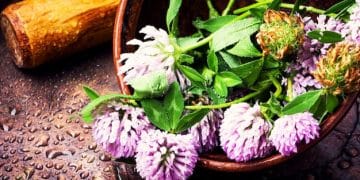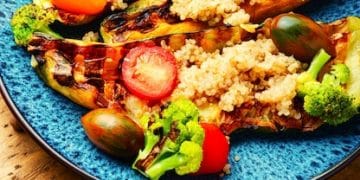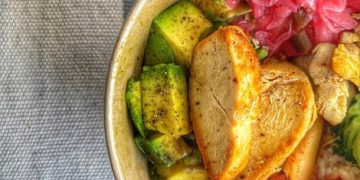Spice Up Your Life: 3 Anti-Inflammatory Curry Recipes (2025)
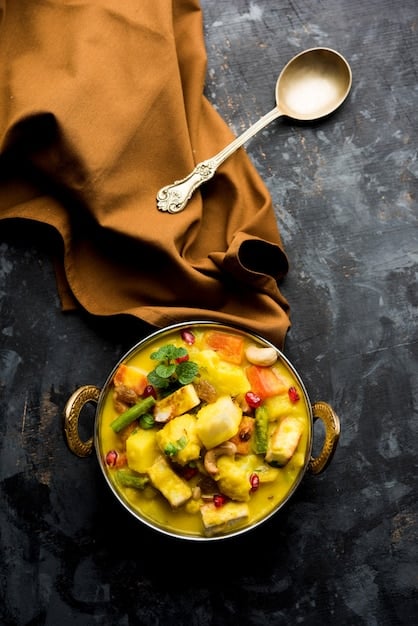
Spice Up Your Life: 3 Anti-Inflammatory Curry Recipes for a Healthy Gut (Updated for 2025) offers a delightful journey into the world of flavorful and health-conscious cooking. These recipes combine the rich, comforting taste of curry with powerful anti-inflammatory ingredients, perfect for supporting gut health and overall well-being.
Looking for a delicious and healthy way to boost your well-being in 2025? Dive into the vibrant world of curry with Spice Up Your Life: 3 Anti-Inflammatory Curry Recipes for a Healthy Gut (Updated for 2025). These recipes are not only packed with flavor but also designed to promote gut health and reduce inflammation.
Discover the Power of Anti-Inflammatory Curries
Curry, with its rich blend of spices, has been a staple in many cultures for centuries. Beyond its delicious taste, curry offers a wealth of health benefits, especially when prepared with anti-inflammatory ingredients. Understanding these benefits can transform your approach to cooking and eating.
Health Benefits of Anti-Inflammatory Spices
Anti-inflammatory spices like turmeric, ginger, and cinnamon are central to many curry recipes. These spices have been shown to reduce inflammation in the body, which can help alleviate symptoms of various chronic conditions.
- Turmeric: Contains curcumin, a potent compound with anti-inflammatory and antioxidant properties.
- Ginger: Helps reduce inflammation and ease digestive issues.
- Cinnamon: Can lower blood sugar levels and reduce inflammation markers.
How Curry Supports Gut Health
A healthy gut is crucial for overall well-being. The spices in curry can promote a balanced gut microbiome by encouraging the growth of beneficial bacteria. This balance aids in digestion, nutrient absorption, and immune function.
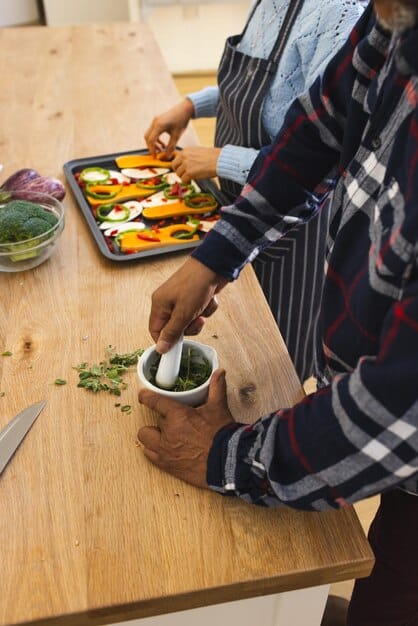
Incorporating curry into your diet can be a proactive way to support your gut health and reduce inflammation. The key is to choose recipes that emphasize fresh, whole ingredients and minimize processed additives.
Recipe 1: Turmeric Coconut Curry with Chickpeas
This creamy and flavorful curry is packed with plant-based protein and anti-inflammatory spices. It’s a simple yet satisfying dish that’s perfect for a weeknight meal. The combination of turmeric, coconut milk, and chickpeas creates a comforting and nutritious experience.
Ingredients You’ll Need
Gather these ingredients to create your Turmeric Coconut Curry with Chickpeas:
- 1 tablespoon coconut oil
- 1 onion, chopped
- 2 cloves garlic, minced
- 1 inch ginger, grated
- 2 teaspoons turmeric powder
- 1 teaspoon cumin powder
- 1/2 teaspoon chili powder
- 1 can (14 ounces) chickpeas, drained and rinsed
- 1 can (13.5 ounces) coconut milk
- 1 cup vegetable broth
- Salt and pepper to taste
- Fresh cilantro, for garnish
Step-by-Step Cooking Instructions
Follow these steps to make your Turmeric Coconut Curry with Chickpeas:
- Heat coconut oil in a large pot over medium heat. Add onion and cook until softened, about 5 minutes.
- Add garlic and ginger, and cook for another minute until fragrant.
- Stir in turmeric, cumin, and chili powder. Cook for 1 minute, allowing the spices to bloom.
- Add chickpeas, coconut milk, and vegetable broth. Bring to a simmer and cook for 15 minutes, stirring occasionally.
- Season with salt and pepper to taste.
- Garnish with fresh cilantro before serving.
Tips for Enhancing Flavor
For an even richer flavor, try adding a squeeze of lime juice or a dash of hot sauce. You can also customize the recipe by adding other vegetables like spinach, bell peppers, or sweet potatoes.
Recipe 2: Ginger Chicken Curry with Vegetables
This wholesome chicken curry is loaded with nutritious vegetables and the powerful anti-inflammatory benefits of ginger. It’s a balanced and satisfying meal that’s both delicious and good for you. The combination of tender chicken, fresh vegetables, and fragrant spices makes this curry a standout.
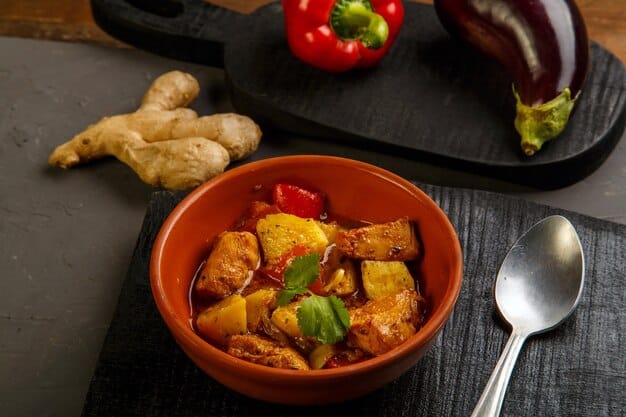
Essential Ingredients
Here’s what you’ll need to make Ginger Chicken Curry with Vegetables:
- 1 tablespoon olive oil
- 1 pound boneless, skinless chicken breasts, cut into cubes
- 1 onion, chopped
- 2 cloves garlic, minced
- 1 inch ginger, grated
- 1 red bell pepper, chopped
- 1 green bell pepper, chopped
- 1 can (14.5 ounces) diced tomatoes
- 2 cups chicken broth
- 1 tablespoon curry powder
- Salt and pepper to taste
- Fresh parsley, for garnish
Cooking Instructions
Follow these instructions to prepare Ginger Chicken Curry with Vegetables:
- Heat olive oil in a large pot over medium-high heat. Add chicken and cook until browned on all sides.
- Remove chicken from the pot and set aside.
- Add onion, garlic, and ginger to the pot and cook until softened, about 5 minutes.
- Add bell peppers and cook for another 3 minutes.
- Stir in diced tomatoes, chicken broth, and curry powder. Bring to a simmer.
- Return chicken to the pot. Reduce heat and simmer for 20 minutes, or until chicken is cooked through.
- Season with salt and pepper to taste.
- Garnish with fresh parsley before serving.
Variations and Substitutions
Feel free to experiment with different vegetables like broccoli, cauliflower, or carrots. For a spicier version, add a pinch of cayenne pepper or some chopped chili peppers. You can also use coconut milk instead of chicken broth for a creamier curry.
Recipe 3: Spicy Cauliflower and Spinach Curry
This vegan-friendly curry is a powerhouse of nutrients, featuring cauliflower and spinach as the star ingredients. It’s a flavorful and satisfying dish that’s perfect for those looking to incorporate more plant-based meals into their diet. The combination of spices, vegetables, and coconut milk creates a delightful culinary experience.
Ingredients Overview
Gather these ingredients before you start cooking:
- 1 tablespoon coconut oil
- 1 onion, chopped
- 2 cloves garlic, minced
- 1 inch ginger, grated
- 1 red chili, finely chopped (optional)
- 1 teaspoon mustard seeds
- 1 teaspoon cumin seeds
- 1 teaspoon coriander powder
- 1/2 teaspoon turmeric powder
- 1 head cauliflower, cut into florets
- 5 ounces spinach, fresh or frozen
- 1 can (13.5 ounces) coconut milk
- Salt and pepper to taste
- Lemon wedges, for serving
Preparation Steps
Follow these steps to make your Spicy Cauliflower and Spinach Curry:
- Heat coconut oil in a large pot over medium heat. Add onion and cook until softened, about 5 minutes.
- Add garlic, ginger, and red chili (if using), and cook for another minute until fragrant.
- Stir in mustard seeds, cumin seeds, coriander powder, and turmeric powder. Cook for 1 minute, allowing the spices to bloom.
- Add cauliflower florets and cook for 5 minutes, stirring occasionally.
- Add spinach and coconut milk. Bring to a simmer and cook for 10 minutes, or until cauliflower is tender and spinach is wilted.
- Season with salt and pepper to taste.
- Serve hot with lemon wedges.
Customization Tips
Adjust the spiciness to your liking by adding more or less chili. For a creamier curry, use full-fat coconut milk. You can also add other vegetables like potatoes, peas, or carrots to enhance the flavor and nutritional value.
Understanding the Anti-Inflammatory Diet
Incorporating anti-inflammatory foods into your diet can have a significant impact on your overall health. Understanding the principles of an anti-inflammatory diet can help you make informed choices about what you eat and how you prepare your meals.
Key Components of an Anti-Inflammatory Diet
An anti-inflammatory diet focuses on consuming foods that help reduce inflammation in the body. This includes:
- Fruits and Vegetables: Rich in antioxidants and phytonutrients.
- Healthy Fats: Omega-3 fatty acids found in fish, flaxseeds, and walnuts.
- Lean Proteins: Chicken, turkey, and plant-based sources like legumes and tofu.
Foods to Avoid
Certain foods can promote inflammation and should be limited or avoided in an anti-inflammatory diet. These include:
- Processed Foods: High in unhealthy fats, sugars, and additives.
- Refined Carbohydrates: White bread, pasta, and sugary cereals.
- Red Meat: Can promote inflammation due to its high saturated fat content.
Designing Your Anti-Inflammatory Meal Plan
Creating a meal plan that focuses on anti-inflammatory foods is easier than you might think. Start by incorporating more fruits, vegetables, and healthy fats into your daily meals. Experiment with different herbs and spices to add flavor and health benefits.
Maximizing Gut Health Through Diet
Gut health is essential for overall well-being. A balanced gut microbiome can improve digestion, boost immunity, and even affect your mood. Dietary choices play a critical role in maintaining a healthy gut.
The Role of Probiotics and Prebiotics
Probiotics are beneficial bacteria that live in your gut. Prebiotics are types of fiber that feed these bacteria. Both are essential for a healthy gut microbiome.
- Probiotics: Found in fermented foods like yogurt, kefir, and sauerkraut.
- Prebiotics: Found in foods like garlic, onions, bananas, and oats.
Lifestyle Factors Affecting Gut Health
In addition to diet, several lifestyle factors can influence your gut health. These include:
- Stress Management: Chronic stress can negatively impact your gut microbiome.
- Hydration: Staying hydrated helps maintain regular bowel movements and supports digestion.
- Exercise: Regular physical activity can promote a healthy gut.
By combining a balanced diet with healthy lifestyle habits, you can optimize your gut health and improve your overall well-being. Focus on incorporating a variety of nutrient-rich foods and managing stress to support a thriving gut microbiome.
Staying Updated with Health Trends in 2025
As we move into 2025, staying informed about the latest health and wellness trends is more important than ever. New research and innovations are constantly emerging, offering new ways to support your health.
Emerging Trends in Anti-Inflammatory Nutrition
Several exciting trends are shaping the future of anti-inflammatory nutrition:
- Personalized Nutrition: Tailoring your diet to your unique genetic makeup and health needs.
- Plant-Based Innovations: New and improved plant-based products that offer enhanced nutritional benefits.
- Functional Foods: Foods that offer specific health benefits beyond basic nutrition.
Resources for Reliable Health Information
With so much information available online, it’s crucial to rely on credible sources. Look for websites and organizations that are backed by scientific research and healthcare professionals.
Staying informed and adapting your diet and lifestyle based on the latest evidence-based recommendations can help you optimize your health and well-being in 2025 and beyond. Embrace the power of informed choices to live a healthier and more vibrant life.
| Key Point | Brief Description |
|---|---|
| 🌱 Anti-Inflammatory Spices | Turmeric, ginger, and cinnamon help reduce inflammation in the body. |
| 🥣 Gut Health | Curry spices promote a balanced gut microbiome, aiding digestion and immunity. |
| 🥗 Anti-Inflammatory Diet | Focus on fruits, vegetables, healthy fats, and lean proteins while avoiding processed foods. |
| 🌿 Probiotics & Prebiotics | Consume fermented foods (probiotics) and fiber-rich foods (prebiotics) for gut health. |
Frequently Asked Questions
Curry contains spices like turmeric, ginger, and chili, known for their potent anti-inflammatory properties. These spices help reduce inflammation and support overall health, making curry a beneficial addition to your diet.
Yes, you can. However, fresh spices often provide more flavor and health benefits. If using curry powder, ensure it’s high-quality and doesn’t contain added sugars or preservatives for optimal health benefits.
Two of the recipes are already vegan-friendly. The Ginger Chicken Curry can easily be adapted by substituting the chicken with tofu or tempeh to maintain its anti-inflammatory properties.
Including curry in your diet a few times a week can provide noticeable health benefits. Consistency is key, so aim for regular consumption as part of a balanced diet to maximize its anti-inflammatory effects.
Pair your curry with foods like leafy greens, berries, nuts, and fatty fish. These foods enhance the anti-inflammatory effects and contribute to a well-rounded, healthy diet for overall well-being.
Conclusion
Embracing these anti-inflammatory curry recipes can be a flavorful step towards a healthier you in 2025. By incorporating these dishes into your diet, you’re not only treating your taste buds but also supporting your gut health and reducing inflammation. Enjoy the journey to wellness, one delicious curry at a time.

